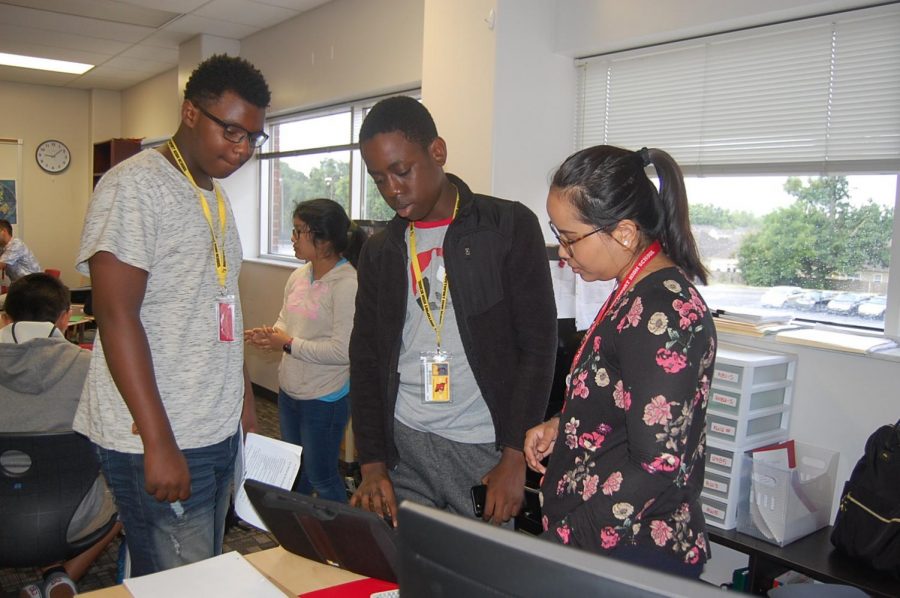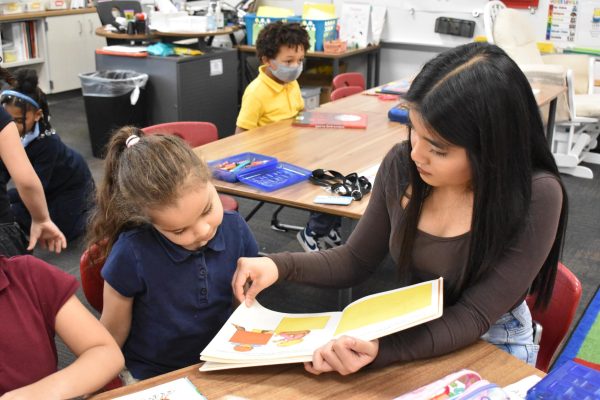Paving the way
Miriam Mawi works with students on in her science classroom. She is the first chin teacher in Perry Township.
Walking down the science hallway during passing period, one can usually see many teachers standing outside their classrooms and greeting students as they pass by. But a new face among the science teachers has started welcoming students since the start of the school year.
On July 24, Miriam Mawi began her career as a biology teacher at SHS. As the first Chin teacher in Perry Township, she said she felt honored to be hired and excited to start teaching her students. However, it wasn’t all easy.
“I feel a lot of pressure being the first (Chin teacher),” Mawi said.
That pressure comes from representing such a present culture in the Southport community. Despite the fact that 20% of the student body at SHS is Chin, there has yet to be the same representation in the school staff. For this reason, Mawi feels that it is important for SHS to have a Chin teacher.
“Southport is very diverse, and students come from different backgrounds,” Mawi said. “I think in the same way, the next thing we need to focus on is the staff. We need the diversity in the staff too.”
Her department chair and fellow biology teacher, Amanda Schnepp, also sees the importance of having Mawi on staff. She believes that students feeling represented at the faculty level should be prioritized.
“Our school and community (are) so diverse, and I think that it’s important for our students to see teachers who are like them,” Schnepp said.
One of the unique things Mawi is able to do is teach some of the sheltered biology classes, which are classes meant to help students who don’t speak English very well yet. Through this, she hopes that she will help her students learn in a way that will make it possible for them to understand the material better.
“Science is hard for our general kids (English-speaking students) to learn,” Mawi said. “Me telling my story about how I was also an ELL student and now a teacher, I think it can encourage (EL students). Also, I can explain better because I speak their language.”
Principal Brian Knight says he thinks Mawi will be able to help these students in a way they can’t find anywhere else.
“I think her ability to be able to translate, teach and support kids in a very different way than any of our teachers can is a huge benefit for the students in her room,” he said.
Her Chin students feel that having her as a teacher will benefit them because she’s able to understand them and it’s easier to connect with someone who had the same experiences as you.
“It’s special to me because I’ve never had a Chin teacher,” Freshman Cung Par said, “And, it’s easier to get along with her because we can talk to her in Chin.”
They also think that having a Chin teacher is important because the students who don’t speak English well yet will be able to ask questions in Chin.
Despite all of the unique qualities her background brings with her, being Chin only played a minor role in hiring her.
“She student-taught in this building so we had some experience with her,” Knight said, “I think that she’s a good teacher.”
During college, Mawi originally didn’t aim to become a teacher, but soon changed her mind after gaining some experience with kids outside of the classroom.
“At first, I didn’t want to become a teacher. I didn’t think I would enjoy it,” Mawi said, “But, I’ve been teaching Sunday School at my church and I really enjoyed it. I loved interacting with the kids.”
Mawi went to East Carolina University in North Carolina for her undergraduate in biology. Then, at the University of Indianapolis, she received a Master of Arts in Education.
Although she feels pressure from being the first Chin teacher not only in SHS, but in Perry Township, Mawi is focusing on making her classroom a comfortable place for her students more than anything.
“For me, I want my students to feel comfortable in my classroom,” she said, “I want them to not be afraid of making mistakes and learn something new.”







